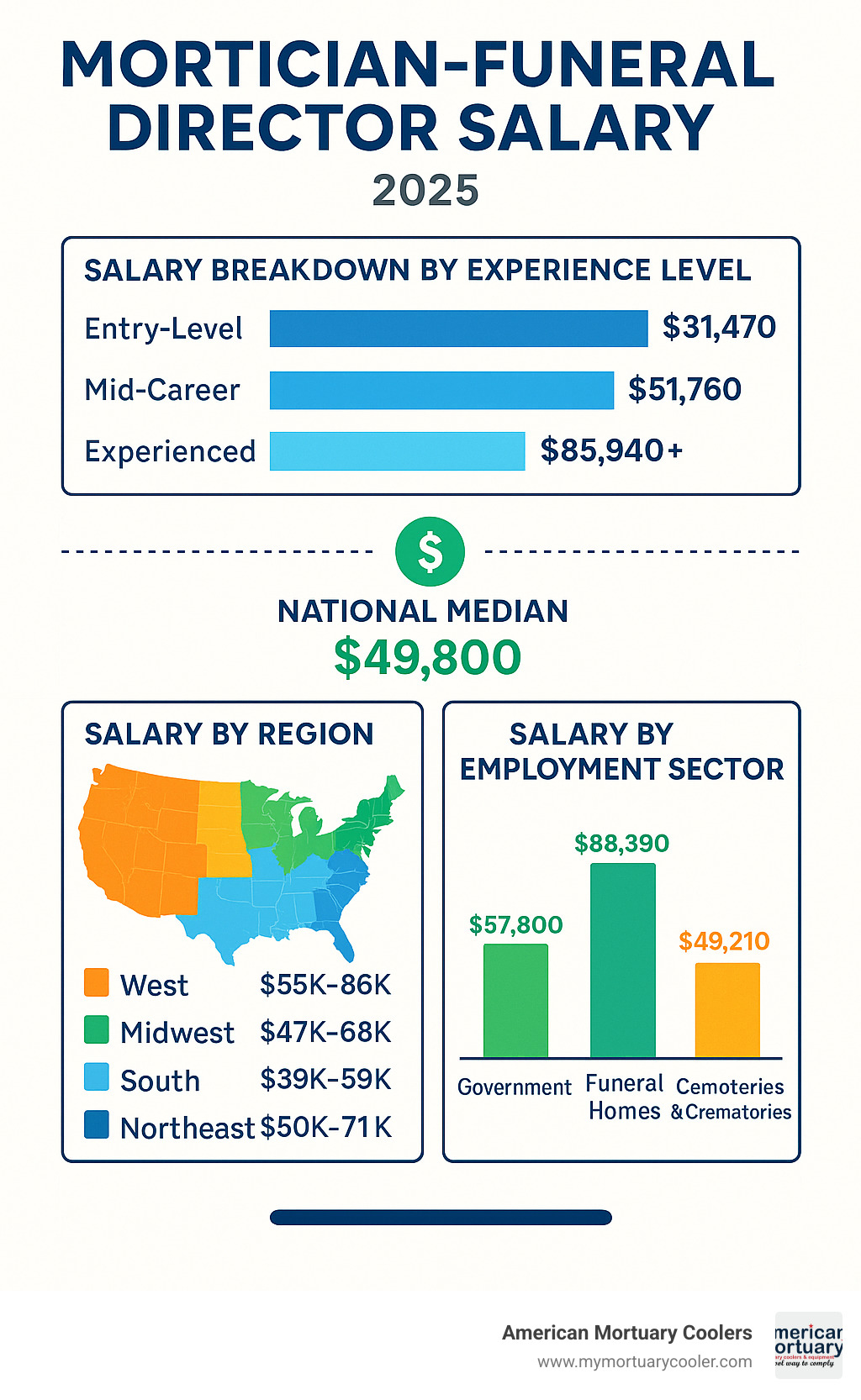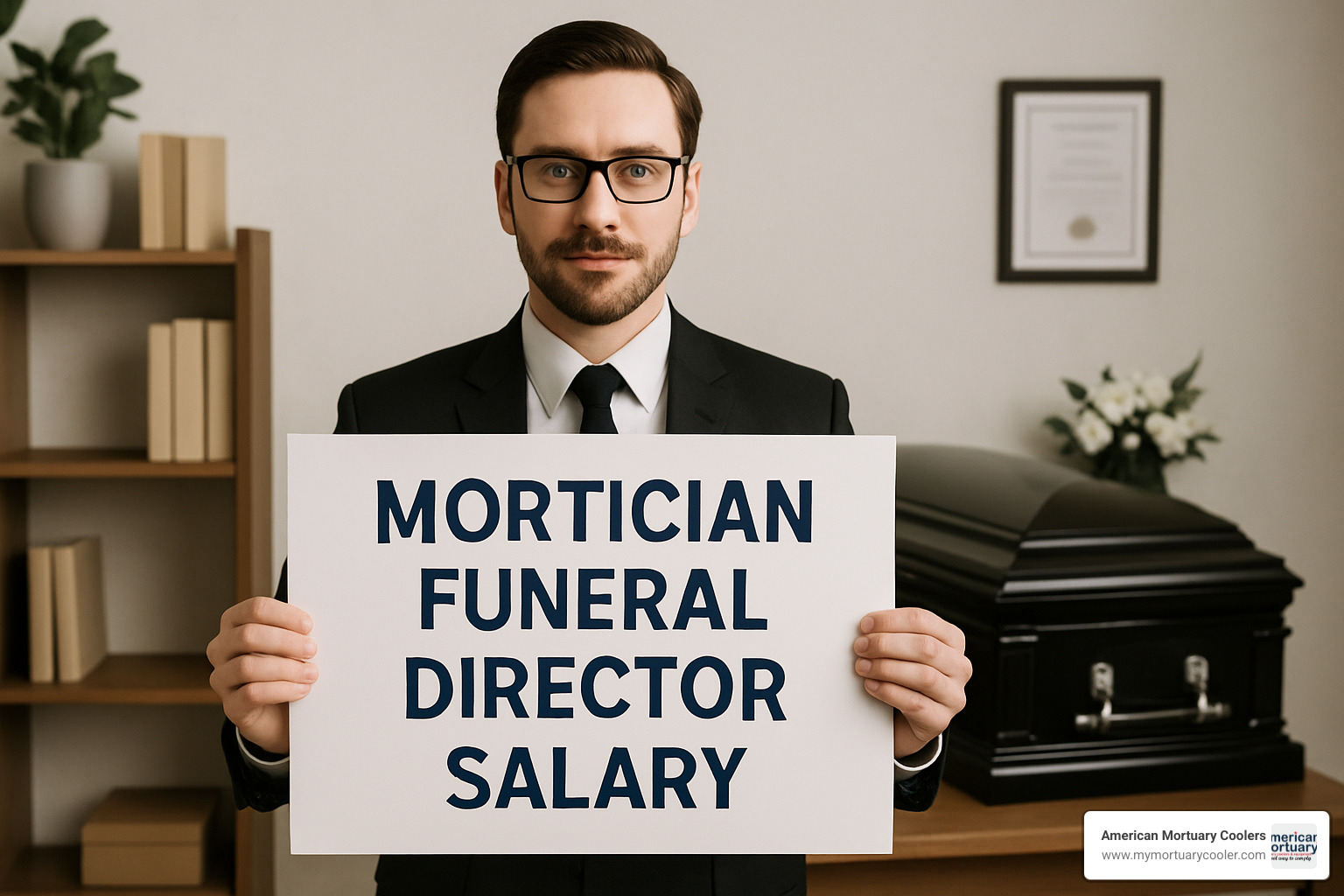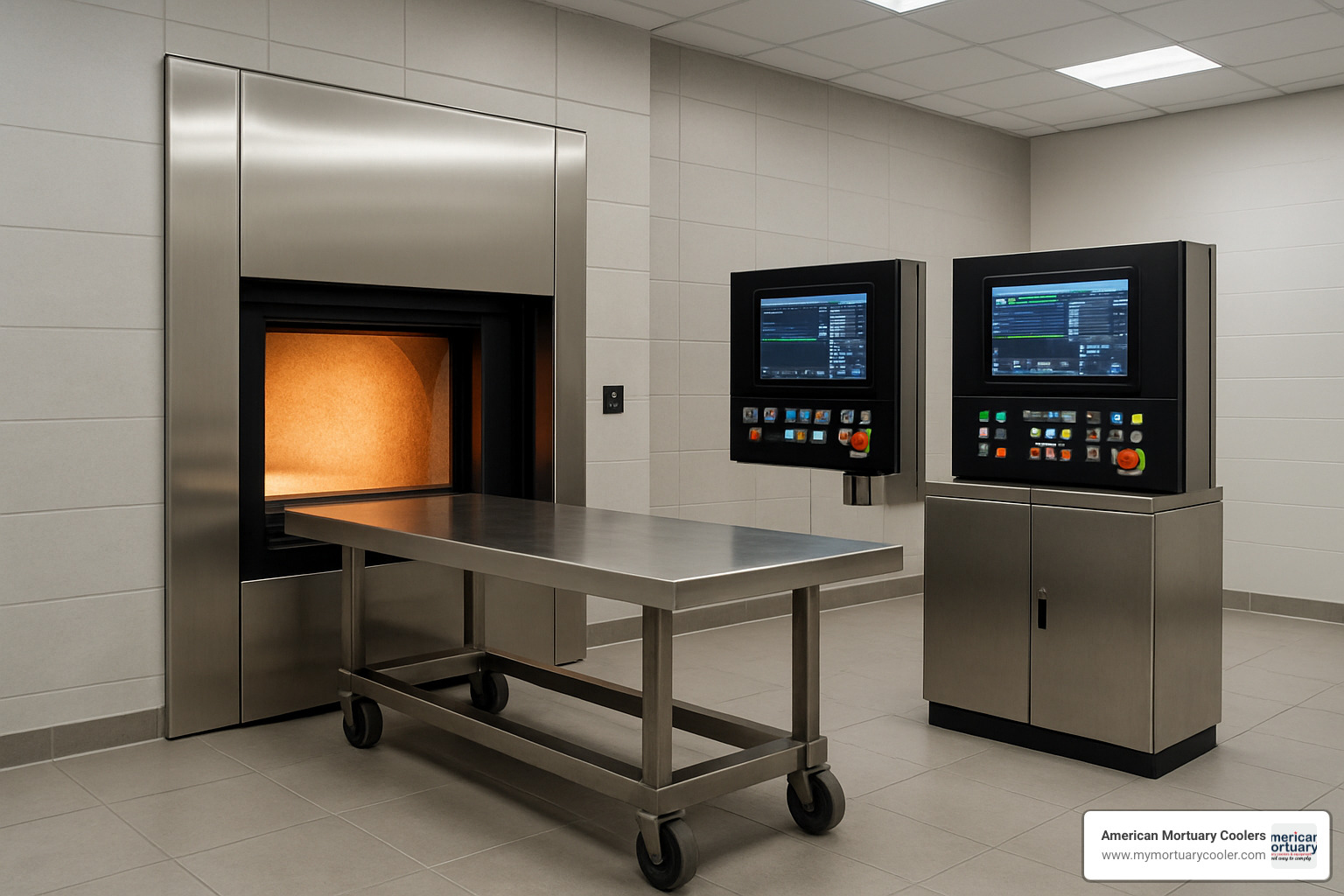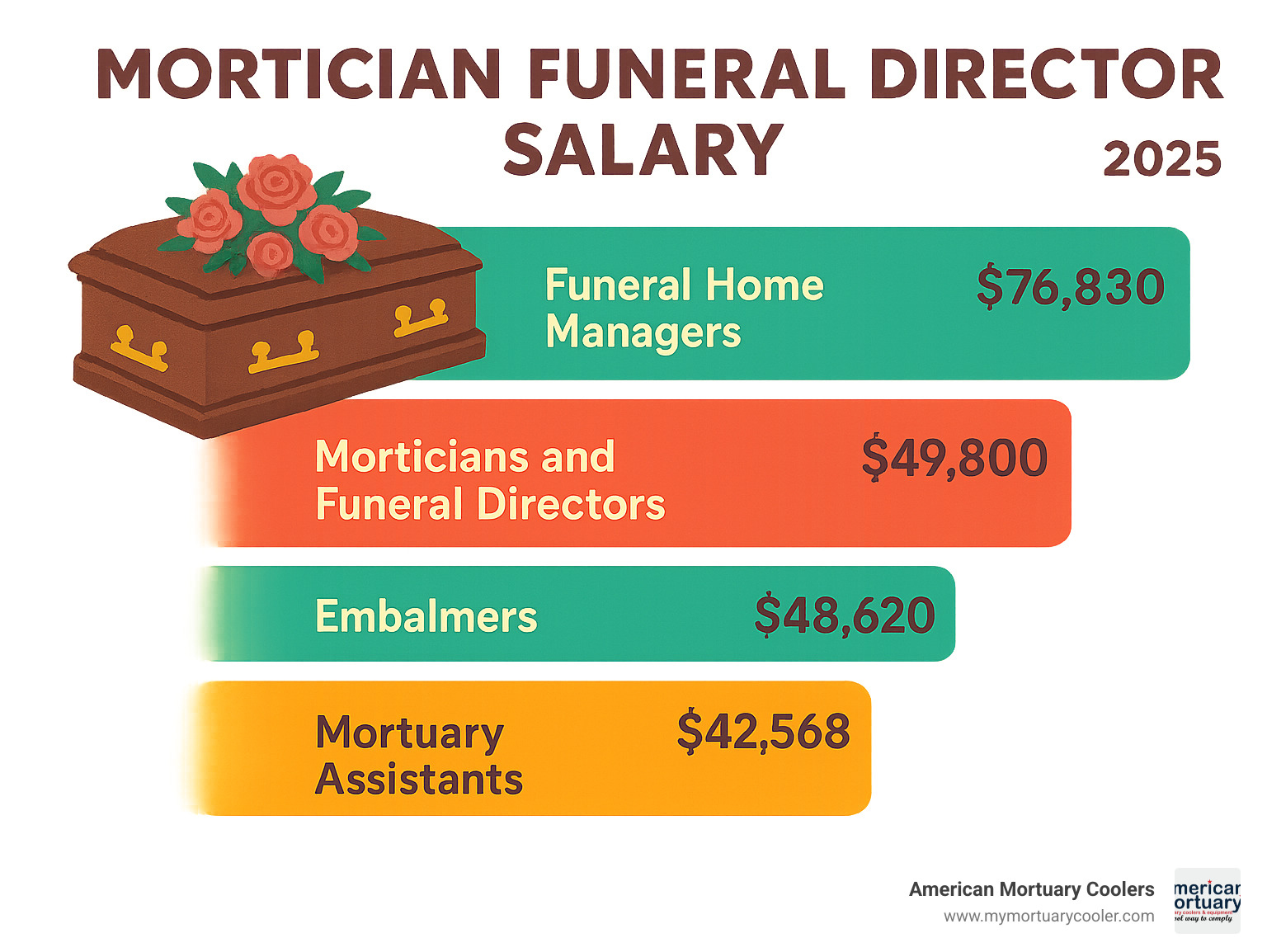Why Understanding Mortician Funeral Director Salary Matters
Mortician funeral director salary ranges vary widely across the United States, making it crucial for both career seekers and industry professionals to understand current compensation trends. Whether you're considering entering the funeral service industry or looking to advance your career, knowing what you can earn helps you make informed decisions about education, location, and career path.
Quick Salary Overview:
- National median: $49,800 per year (May 2024)
- Entry-level range: $31,470 - $38,750
- Experienced professionals: $75,690 - $85,940+
- Top-paying states: Rhode Island ($84,120), Minnesota ($83,990), North Dakota ($77,810)
- Funeral home managers: $76,830 median
The funeral service industry offers stable employment with projected 4% growth through 2033. However, salaries depend heavily on factors like location, experience level, education, and type of employer. Government positions typically pay the highest at $88,390 average annual wage, while traditional funeral homes average around $57,800.
Understanding these salary ranges becomes especially important when you consider the significant investment required for mortuary science education and licensing. The field also demands 24/7 availability, holiday work, and emotional resilience - factors that should be weighed against compensation potential.
As one experienced mortician shared after 30 years in the field: "I love the job, with some caveats, however." The profession offers meaningful work helping families during difficult times, but comes with unique challenges that impact work-life balance.
We're American Mortuary Coolers, a Tennessee-based mortuary equipment supplier who works closely with funeral professionals across the country. Through our experience supplying custom mortuary coolers and equipment to funeral homes nationwide, we've gained valuable insights into mortician funeral director salary trends and how compensation varies by region and facility type.

mortician funeral director salary: National Snapshot 2025
When we look at the numbers for 2025, mortician funeral director salary figures paint an interesting picture of steady growth and opportunity. The Bureau of Labor Statistics May 2024 data shows the median annual wage has reached $49,800, but here's where it gets interesting - the mean annual wage sits at $58,020. That gap tells us something important: experienced professionals and those in specialized roles are earning significantly more than the median suggests.
The wage distribution reveals the true earning potential in this field. At the 10th percentile, entry-level professionals earn around $31,470 annually. The 25th percentile sits at approximately $40,000, while the 75th percentile reaches about $70,000. The top earners at the 90th percentile bring home $85,940 or more, showing nearly triple the earning potential of entry-level positions.
With approximately 24,200 morticians, undertakers, and funeral arrangers employed nationally according to our Create Customized Tables analysis, the profession maintains a stable workforce with room for growth.
Median mortician funeral director salary explained
That $49,800 median represents the sweet spot where half of all funeral service professionals earn more and half earn less. What makes this figure particularly meaningful is how it's grown over recent years, reflecting both the specialized nature of our work and increasing demand for services.
The income distribution in funeral service looks different from many other professions. Instead of everyone clustering around that median number, we see a much wider spread. This means there's genuine opportunity to grow your earnings as you gain experience and develop specialized skills.
Wage growth trends have been relatively stable, with annual increases typically matching or slightly exceeding inflation. However, your geographic location can make or break your earning potential. A funeral director in Rhode Island earning $84,120 annually has a vastly different financial reality than someone making the national median.
How the mortician funeral director salary stacks up by industry
Not all funeral service employers offer the same compensation, and the differences might surprise you. Government sector positions lead the pack with a mean annual wage of $88,390 - that's a substantial premium over private sector work. These roles often come with superior benefits packages and job security that private employers struggle to match.
Educational institutions like colleges, universities, and professional schools offer the second-highest compensation at $78,790 mean annual wage. These positions typically involve teaching mortuary science programs and often include research responsibilities.
Traditional funeral homes and mortuaries in the death care services sector average $57,800 annually. While this represents the majority of employment opportunities in our field, many of these positions offer profit-sharing opportunities and other benefits that can significantly boost total compensation.
Employer size also plays a role in determining your paycheck. Larger funeral home chains often provide more structured compensation packages with clear advancement paths, while smaller family-owned operations may offer more personalized benefits and flexibility.
The key takeaway? Where you work matters just as much as what you do when it comes to maximizing your mortician funeral director salary potential.
State and Metro Pay Hotspots
Where you work makes a huge difference in your earning potential. Some states pay mortician funeral director salary rates that are nearly double what you'd earn elsewhere, though you'll want to factor in living costs too.
Rhode Island leads the pack with funeral directors earning an average of $84,120 annually. That's impressive for such a small state, but the cost of living reflects those higher wages. Minnesota comes in second at $83,990 - and many professionals find the quality of life there makes it particularly attractive.
North Dakota rounds out the top three at $77,810 average annual wage. What makes North Dakota especially interesting is that your money goes much further there than in coastal states. Housing costs are reasonable, and there's no shortage of work opportunities.
Connecticut deserves special mention - some sources report average salaries reaching $110,400, which would make it the highest-paying state for funeral service professionals. The proximity to major metropolitan areas like New York City drives up both wages and living costs.

Metropolitan Area Spotlight: Las Vegas Case Study
Las Vegas offers a fascinating look at how regional markets work. The numbers might surprise you - the average base salary sits at $35,170 per year, which seems low compared to national figures. But here's where it gets interesting.
Entry-level professionals in Las Vegas start around $26,620, while mid-career workers with 5-9 years of experience earn that $35,170 average. Late-career professionals with 20+ years of experience can reach $86,040 - showing significant growth potential.
The real story in Las Vegas isn't just the base salary. Nevada has no state income tax, which puts more money in your pocket. Housing costs, while rising, remain more reasonable than cities like San Francisco or Boston. Plus, the 24/7 nature of Las Vegas means funeral homes often need coverage during unconventional hours, creating overtime opportunities.
Cost-of-Living Impact
Smart professionals always look beyond the salary number. A mortician funeral director salary of $50,000 in rural Alabama provides much different purchasing power than the same amount in Manhattan.
State and local taxes can eat up a significant portion of your income. States like Texas, Florida, and Nevada with no income tax give you an automatic advantage. Housing costs often represent your biggest expense - what costs $200,000 in one state might cost $800,000 in another.
Healthcare expenses vary dramatically by region, and many funeral homes offer different levels of coverage. Transportation costs matter too - some areas require long commutes, while others let you walk to work.
We've worked with funeral homes across the country, and we consistently hear that quality of life factors often matter more than raw salary numbers. Access to good schools, cultural activities, and outdoor recreation can make a lower salary feel more valuable.
The Create Customized Tables tool lets you dive deep into specific metropolitan areas you're considering. It's worth spending time comparing not just wages, but the complete financial picture of different locations.
Career Stage, Credentials & Other Pay Drivers
Your mortician funeral director salary grows with smart career moves, not just years on the clock.
- Starting out: about $31,000 right after mortuary school.
- Mid-career (5-10 yrs): $50,000-$60,000.
- Seasoned (15+ yrs): $75,000-$85,940+.
Jumping into management brings the biggest raise. Funeral home managers see a median $76,830, and many clear six figures because they run the business side of operations.
Education matters. An ABFSE associate degree gets you licensed, but a bachelor’s in business, psychology, or counseling can add 10-15 % to pay and speed up promotions. NFDA and CANA certifications also open up raises because they prove ongoing competency.
Compensation rarely stops at base pay. Typical extras include:
- Bonuses: $495-$6,000
- Profit sharing: $983-$3,000
- Commission on preneed sales: $500-$20,000
- Overtime and on-call premiums at time-and-a-half
See the full licensing path in How to Become a Mortician in 7 Easy-to-Follow Steps.
Boosting pay through education & specialization
Continue learning. Grief counseling, business management, or advanced embalming courses satisfy CE requirements and differentiate you from peers. States with license reciprocity make relocation to higher-pay markets easier, so check rules before moving.
Specialties like cremation operations, green burials, or veteran services often command premium fees because few professionals offer them.
Beyond wages: schedule realities
Death ignores office hours. Expect weekends, holidays, and 2 AM removals. While demanding, overtime and call-out pay soften the blow and many professionals find the work’s meaning worth the sacrifice.
Job Outlook & Industry Trends Affecting Earnings
The industry isn’t shrinking — it's evolving. Employment is projected to grow 4 % between 2023 and 2033, adding roughly 5,800 jobs as baby boomers age.

Key trends that can raise your mortician funeral director salary:
- Cremation dominance (50 %+): creates demand for licensed crematory operators and celebration-of-life planners.
- Green & alternative services: natural burials and biodegradable products carry premium price tags.
- Tech adoption: live-streaming, digital memorials, and modern embalming gear reward tech-savvy staff with higher pay.
- Entrepreneurship: consultants, niche cultural services, and suppliers (like American Mortuary Coolers) carve out lucrative markets.
Use A Comprehensive Guide to Mortuary Science and regional projections at www.projectionscentral.org to spot local demand. Professionals who adapt quickly will see these changes as gateways to higher earnings, not threats.
mortician funeral director salary vs. Similar Occupations
When considering a career in funeral service, it's helpful to see how mortician funeral director salary stacks up against related professions. The funeral industry offers several career paths, each with different earning potential and responsibilities.
Funeral home managers sit at the top of the traditional funeral service ladder, earning a median of $76,830 annually. These professionals handle the business side of operations - managing staff, overseeing finances, and building community relationships. What's particularly attractive about this role is that 58% of funeral home managers are self-employed according to BLS data, which opens up significant earning potential beyond traditional salaries.
The core morticians and funeral directors earn that median $49,800 we've discussed throughout this guide. These professionals work directly with grieving families, coordinate ceremonies, and handle the day-to-day operations that make funeral services meaningful and memorable.
Mortuary assistants represent the entry point into funeral service, earning an average of $42,568. While this might seem significantly lower, these positions offer valuable hands-on experience and often serve as stepping stones to director roles. Many successful funeral directors started as assistants and worked their way up.
Embalmers occupy a specialized niche with salaries varying widely by region. In California, for example, embalmers average $48,620. What makes this role unique is that embalmers often work for multiple funeral homes, creating opportunities for higher total earnings through contract work.

When you look beyond traditional funeral service, coroners and medical examiners often earn higher salaries due to government employment and specialized medical training requirements. Pathologists earn significantly more, but they require medical degrees and years of additional training.
The beauty of the funeral service industry lies in its clear advancement opportunities. You might start as a mortuary assistant, advance to funeral director, then move into management, and potentially become a business owner. Along the way, you can develop specialties like crematory operations, grief counseling, or preneed planning.
Some professionals branch out into teaching positions at mortuary science schools or move into industry consulting and equipment sales. These alternative paths can offer both variety and competitive compensation.
The career ladder in funeral service rewards dedication and skill development. Unlike many industries where advancement requires changing companies, funeral service often promotes from within, recognizing the value of experience and established community relationships.
For those just starting their journey, our Detailed Guide to Mortician Assistant Salary and Pay Expectations provides detailed insights into entry-level opportunities and growth potential.
Frequently Asked Questions about Mortician and Funeral Director Pay
What additional compensation can funeral directors expect?
When discussing mortician funeral director salary, it's important to understand that your paycheck often includes more than just your base wage. Most funeral service professionals receive additional compensation that can significantly boost their total earnings.
Performance bonuses are common in the industry, typically ranging from $495 to $6,000 annually depending on your funeral home's performance and your individual contributions. Many funeral directors also earn commission income from preneed sales, which can add anywhere from $500 to $20,000 to your yearly earnings. The wide range reflects how successful some professionals become at helping families plan ahead.
Profit sharing is another benefit offered by many funeral homes, usually adding $983 to $3,000 annually to your compensation. This creates a nice incentive where your success directly ties to the business's success.
Beyond monetary bonuses, most funeral service positions come with solid benefits packages. About 80% of employers provide medical coverage, while 48% offer dental and 28% include vision insurance. Retirement plans are standard, and many funeral homes provide life insurance at no cost to employees. Continuing education allowances help you maintain your licenses and stay current with industry developments.
How do on-call hours impact total earnings?
The reality of funeral service is that death doesn't follow a 9-to-5 schedule, and this significantly affects your total mortician funeral director salary. While the on-call requirements can be challenging for your personal life, they often provide substantial additional income.
Overtime compensation kicks in for any hours worked beyond 40 per week, typically paid at time-and-a-half rates. During holidays, some locations pay double-time rates. Most funeral homes also guarantee minimum call-out pay, usually covering 2-4 hours of work even if the actual call takes less time.
Many funeral homes pay standby compensation for being available during on-call periods. This ranges from $2-5 per hour or flat daily fees of $25-100. You'll also typically receive mileage reimbursement for emergency calls, plus allowances for maintaining your phone and other equipment.
The schedule reality means your workday might start at 7 AM and run until 10 PM, with emergency calls potentially extending things further. While this demanding schedule impacts work-life balance, it often justifies higher total compensation compared to standard business-hour positions.
Is there potential to earn six-figure salaries in funeral service?
Absolutely! While the median mortician funeral director salary sits around $49,800, several career paths can lead to six-figure earning potential in funeral service.
Ownership and management roles offer the highest earning potential. Funeral home owners have unlimited earning potential, while regional management positions typically range from $90,000 to $150,000 or more. Corporate positions within larger funeral service companies can reach $80,000 to $200,000 annually.
Specialized positions often command premium salaries. Government forensic roles average $88,390 or higher, while teaching positions at mortuary science schools average $78,790. Consulting work and expert witness testimony can pay $100 or more per hour for experienced professionals.
Geographic location plays a huge role in six-figure potential. High-cost areas like Connecticut show average salaries of $110,400 or more. Government positions in major metropolitan areas and specialized facilities like medical examiner offices or university programs often exceed six figures.
Business development opportunities within funeral service can also reach six-figure territory. Preneed sales specialists, professionals who combine funeral service with insurance and estate planning, grief counseling practitioners, and those who start equipment and supply businesses all have significant earning potential.
The top 10% of funeral service workers already earn over $85,940 annually, with many management and ownership positions well into six-figure territory. The key is gaining experience, developing specialized skills, and positioning yourself for advancement opportunities.
Conclusion
If you're considering a career in funeral service or looking to advance your current position, understanding mortician funeral director salary trends gives you the foundation to make smart career moves. The numbers tell a clear story: this is a profession that rewards dedication, education, and experience with steady income growth and meaningful work.
The national median of $49,800 might seem modest at first glance, but remember that's just the starting point. Entry-level professionals earning around $31,470 can realistically expect to reach $85,940 or higher as they gain experience and advance into management roles. Location plays a huge role too - professionals in Rhode Island average $84,120, while those in Minnesota earn $83,990.
Experience truly pays in this field. We've seen how salaries can nearly triple from entry-level to management positions. A mortuary assistant starting at $42,568 can advance to funeral director at $49,800, then potentially move into funeral home management at $76,830 or higher.
Your educational investment matters more than you might think. That ABFSE-accredited mortuary science degree isn't just a licensing requirement - it's your ticket to better opportunities. Add continuing education, professional certifications from organizations like NFDA and CANA, and you're positioning yourself for the higher end of the salary spectrum.
When negotiating your next position, remember to look beyond base salary. Factor in bonuses that can range from $495 to $6,000 annually, profit sharing opportunities, and the significant overtime potential from on-call work. Use resources like Create Customized Tables to research what professionals in your specific area are earning.
The industry trends look promising. With 4% growth projected through 2033 and an aging population driving demand, job security remains strong. Yes, cremation rates are changing the traditional funeral model, but this creates new specialization opportunities rather than eliminating jobs entirely.
Your career roadmap is straightforward: start with solid education, gain hands-on experience, pursue relevant certifications, and consider specialization areas that interest you. Whether that's crematory operations, preneed sales, or eventually funeral home ownership, the paths are there for ambitious professionals.
At American Mortuary Coolers, we work with funeral professionals across all 48 contiguous states, and we've seen how dedicated individuals build successful careers in this industry. Our custom mortuary coolers and equipment support the daily operations that make funeral homes successful, and we're proud to be part of this essential industry.
The funeral service profession offers something increasingly rare in today's job market: stable employment doing meaningful work that truly matters to families in their time of greatest need. While the 24/7 schedule and emotional demands aren't for everyone, those who thrive in funeral service often find it deeply rewarding both personally and financially.
Whether you're just starting out or planning your next career move, the salary data and trends we've covered give you the information needed to make confident decisions. The opportunities are there - it's up to you to pursue them.
For additional insights into building a successful funeral service career, check out our detailed resource: More info about understanding mortician salaries.

















